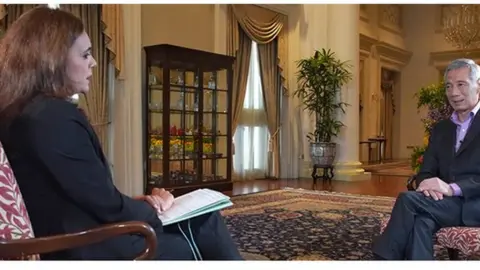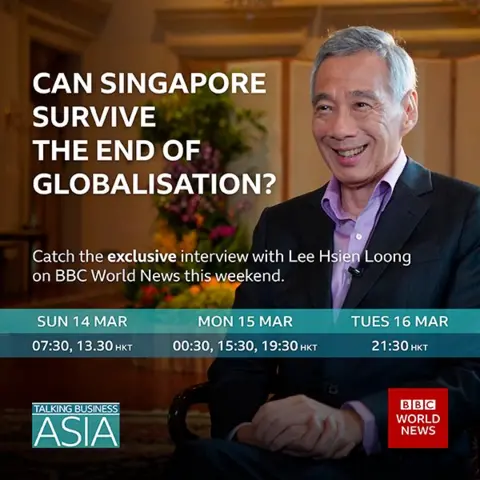Singapore PM: 'Considerable risk' of severe US-China tensions
Singapore's Prime Minister Lee Hsien Loong has told the BBC that a clash between the US and China is more likely than it was five years ago.
However, he maintained that the odds of military conflict are "not yet high".
The prime minister said if both nations continue to take a hard line because of domestic considerations, they could easily find themselves at an impasse.
The Biden administration will hold its first high-level talks with Chinese officials in Alaska next week.
Mr Lee was reluctant to give advice to China but noted its political direction had sparked tensions with nations big and small.
"There is significant uncertainty [and] anxiety over which way China is going and whether this will be good for them," he told BBC World News' Talking Business Asia programme.
"I do not think that is in China's interest."
The Singaporean leader's views on the US-China relationship are often sought, as the tiny island nation plays an outsized role economically and in terms of political influence in the region.
The US is a major security partner for the city state and is also the biggest investor in Singapore, far out-stripping any other country's contribution.
Meanwhile, China is Singapore's largest export market and, like much of Asia, Singapore's economy has benefited from China's rise.
US-China trade war
The bitter trade war between the two superpowers over the last two years has threatened this delicate balance.
It started during former US President Donald Trump's time in office, but there's been no indication that newly-elected President Joe Biden will take a softer approach with China.
Prime Minister Lee said he hoped the new American leader would be someone who "believes in multilateralism and international trade".
He also addressed the tussle for global dominance between the two.
"The US is still number one but number two [China] is not so far behind," he said. "That is what is difficult for the US to accept."
By some estimates, the Chinese economy is slated to overtake the US to become the world's largest by 2028, five years earlier than previously forecast.
China's remarkable economic rise has in recent years been accompanied by increasing aggression both internally and externally under leader Xi Jinping.
 Prime Minsiter's Office
Prime Minsiter's OfficeChina's rise
That has led to condemnation of its actions by many in the West and concern among some partners in Asia.
Despite this, Prime Minister Lee said Singapore could not afford to take sides.
"It is a problem for many countries, which is why we are all hoping and encouraging the two large powers to think very carefully before deciding that the other one is an adversary which has to be kept down, if not put down," he said.
"What we would like to see is China being a country where its prosperity, development and growing strength is welcomed by other countries in the world, who see this as an opportunity for them to prosper together and live in a stable world together."
The deterioration in US-China ties is taking place against the backdrop of the pandemic and a backlash against globalisation, an economic trend that has helped Singapore become one of the richest countries in Asia.
Prime Minister Lee believes globalisation still has much going for it, especially given the need to cooperate on vaccines.
"You cannot avoid working with one another because to go back to where you were... lies poverty and despair and probably instability and conflict," he said.
Post-pandemic travel
Closer to home, one of the key priorities for Singapore is to open borders and find a way for tourists to return to the trade and travel-dependent nation.
The prime minister suggested vaccination passports could be part of that process but warned it would be some time before international travel returned to pre-pandemic levels.
"It will not be like before where you can just buy a ticket, hop onto the plane and go off to Hong Kong, Bangkok or Bali for a weekend or a casual holiday," he said.
"Hopefully by the end of this year or next year the doors can start to open, if not earlier."
You can watch more of Singapore Prime Minister Lee Hsien Loong's interview on BBC World News Talking Business Asia programme: The End of Globalisation this weekend at the following times:

